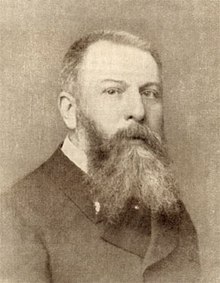Antonio Starabba di Rudinì
Antonio Starabba, Marchese di Rudinì (born April 6, 1839 in Palermo , † August 6, 1908 in Rome ) was an Italian landowner , lawyer and politician . He was President of the Council of Ministers (Prime Minister) of Italy from 1891 to 1892 and again from 1896 to 1898.
Political rise
Starabba came from an old and wealthy Sicilian noble family. He studied law at the University of Palermo and became a lawyer. In 1859 he joined a revolutionary committee that supported Giuseppe Garibaldi and prepared the procession of the thousand in 1860. After a brief activity in the Ministry of Foreign Affairs in the then Italian capital Turin , he was appointed Sindaco ( Mayor ) of Palermo, where he began to modernize the city architecturally and infrastructurally . In 1866 he was instrumental in the suppression of an uprising that the supporters of the Neapolitan Bourbons, overthrown in 1860, staged against the Italian government with the support of the Church. The fame thus acquired led to the appointment of Starabbas as Prefect of the Province of Palermo. In this role he fought the brigands that were particularly numerous in Sicily . In 1868 he became Prefect of the Province of Naples .
In October 1869 he became Minister of the Interior in the Menabrea cabinet , but resigned with this government a few months later. In the Chamber of Deputies (from the 10th legislative period) Starabba represented Canicattì ( Province of Agrigento ); from 1882 he was elected to the Chamber for Syracuse . In 1886 he succeeded Marco Minghetti, who died in office, as leader of the historical right , one of the parliamentary followers that emerged in the Trasformismo .
The Starabba Governments
First term and fall
In early 1891 he succeeded Francesco Crispi as Prime Minister and Foreign Minister and formed a coalition government with a faction of the Left led by Giovanni Nicotera. This government was unstable from the start, but implemented some economic reforms that later ended the chronic crisis of the Italian budget and also extended the Triple Alliance treaty. In May 1892 the government was overthrown by a vote of no confidence and Giovanni Giolitti succeeded him. When his opponent Francesco Crispi regained power in December 1893, he continued his political activity and allied himself with the radical party leader Felice Cavallotti .
Second term
The crisis following the defeat in the Battle of Adua on March 1, 1896, allowed Starabba to return to serving as Prime Minister and Minister of the Interior in a government formed by General Ricotti . Starabba signed the peace treaty with Ethiopia , but worsened relations with the United Kingdom through the unsettled publication of confidential diplomatic documents in a Green Paper on the Ethiopian problem. In order to satisfy the anti-colonial movement , he gave Kassala to the British, but disappointed the colonial advocates within Italian public opinion very much.
Domestically, Starabba's second term in office was marked by three cabinet reshuffles (July 1896, December 1897 and May 1898) and the fight against the Crispis party. Numerous members of the agricultural workers ' union fasci siciliani arrested under Crispi were pardoned and released from prison and the first building blocks of Italian social legislation were introduced: the previously only voluntary health insurance became compulsory for industrial workers , its costs had to be borne entirely by the employers , and a (initially voluntary) old-age and disability insurance was created .
End of political career
At the beginning of 1897, the Starabba government dissolved the House of Representatives and favored radical (left-liberal) candidates for the new election . This left-wing swing of politics resulted in popular unrest in May 1898, the suppression of which required the state of siege in Milan , Naples , Florence and Livorno and also led to bloodshed in Milan. The outrage on both sides of the political spectrum - the left resented the bloodshed, the right resented that he had let the situation drift by then - ultimately led to his overthrow in June 1898. He remained a simple member of parliament until his death.
Starabba was one of the most powerful landowners in Sicily , who managed his estates according to liberal principles. This probably contributed to the fact that his goods from the then frequent and z. Sometimes violent clashes between landowners and farm workers were not affected.
literature
- Rudinì, Antonio Starabba, Marquis di . In: Encyclopædia Britannica . 11th edition. tape 23 : Refectory - Sainte-Beuve . London 1911, p. 815 (English, full text [ Wikisource ]).
- Giuseppe Astuto: Rudinì, Antonio Starabba marchese di. In: Raffaele Romanelli (ed.): Dizionario Biografico degli Italiani (DBI). Volume 89: Rovereto – Salvemini. Istituto della Enciclopedia Italiana, Rome 2017.
Web links
- Entry on Antonio Di Rudinì (Starrabba) in the Portale storico of the Camera dei deputati
- Antonio Starrabba in the Palermo Biographical Archive
- Rudinì, Antonio Starrabba marchese di. In: Enciclopedie on line. Istituto della Enciclopedia Italiana, Rome. Retrieved February 19, 2016.
annotation
- Portions of this article are the translation of the text now available in the Encyclopedia Britannica 1911.
| personal data | |
|---|---|
| SURNAME | Rudinì, Antonio Starabba di |
| ALTERNATIVE NAMES | Rudinì, Antonio Starabba Marchese di |
| BRIEF DESCRIPTION | Italian politician, member of the Camera dei deputati |
| DATE OF BIRTH | April 6, 1839 |
| PLACE OF BIRTH | Palermo |
| DATE OF DEATH | August 6, 1908 |
| Place of death | Rome |
